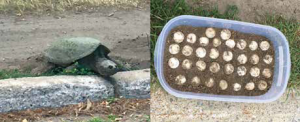Gypsy Moths – No bite, no bark
Your most recent issue landed yesterday. A great read as always.
The piece on Gypsy Moths by Jason McLean was rich and informative (no
surprise, he’s an expert). But the cutline under the Gypsy Moth photo (“The male
Gypsy Moth . . . can strip the bark off a tree within a few days) is wrong on two
counts.
First, moths can’t eat — they have no mouth. Second, it’s the larva (caterpillar) of
the Gypsy Moth which does the eating, and it eats leaves, not bark.
As far as I know, no caterpillar on the planet, of any species, eats bark. Moths
that do eat, eat leaves or siphon nectar from flowers through a sort of tube mouth.
Gypsy Moths in adult stage do not eat. Adult Moths, male and female, have a twoweek
life with the sole purpose of procreation. The female lays eggs, they hatch,
producing the larva (caterpillars), which indeed eat voraciously. Mom and Dad die
fulfilled.
That said, the whole June issue is jammed with news you can use, news to
amuse, and news a reader hasn’t even imagined. Keep it up!
Roger Bird,
McGillivray Street
[Editor’s Note: Correspondent Roger Bird heads up the Old Ottawa
East Birding Group and leads birding tours within the community.
As he quite correctly points out, our Gypsy Moth reporter Jayson
McLean is a very knowledgeable individual whose article in the June
issue was entirely factual and accurate. But, alas, the same cannot be
said for the article’s editor who supplied the incorrect cutline below
the photo of the Gypsy Moth. In this case, the “bark stops here”, with
the Editor-in-Chief, and not with Jayson!]
A sad postscript
After the recent announcement of the discovery of unmarked graves at the
former Kamloops Indian Residential School, I wish to bring to your attention the
following information. The Oblates of Mary Immaculate who taught at that school
had their headquarters in the Deschâtelets Building on Main Street in Old Ottawa
East. They also taught at the St. Eugene Residential School outside of Cranbrook,
B.C. The Oblates of Mary Immaculate no longer reside or own the Deschâtelets
Building, which is currently being renovated and re-purposed.
Pam MacDonald,
Old Ottawa South
Sharing the path
I cheered, as did many other Old Ottawa East residents, when so many
snapping turtles laid their eggs along the river in our community this spring.
It was also heartening when local residents and the Canadian Wildlife Service
(CWS) put protective netting and boxes in place to protect those nests against
predation.
I wanted to find out more about these wonderful creatures. One of the
biggest challenges for the Common Snapping Turtle is the mortality rate from
crossing roads when they emerge from their water home to lay eggs. Another
issue is that typically 80% of nests are destroyed by predators. While a typical
nest contains 20 to 40 eggs, only 5% of the eggs laid survive to hatch, and of
those, only 1% may survive to reproductive age. Thus, we should try to do
everything we can to help these majestic creatures thrive.
I was therefore disappointed when I saw the CWS biologists moving the
eggs of two nests because of the complaints of cyclists who wanted to be able
to continue to ride along a very short stretch of the narrow dirt trail beside
Brantwood Drive near Centennial Boulevard. I understand the desire to
ride by the river, but I do not understand why some cyclists felt it was more
important for them to be able to ride on a dirt trail beside a wide quiet street
than for the turtle eggs to hatch in place.
Phyllis Odenbach Sutton,
Rosemere Avenue







